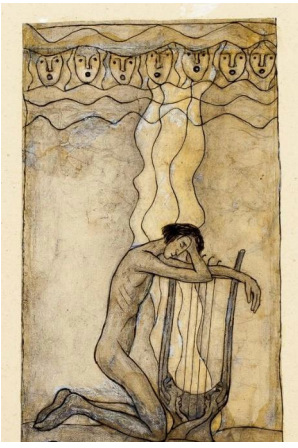
World Poetry Today: Production, Translation, Reception
Tartu, Estonia, October 1 to 4, 2025
Poetry is inherently “worldly”, both polytemporal and polyspatial, as stated by Jahan Ramazani. While poems belong to their immediate historical moment and national culture, they are at the same time transnational as well as transhistorical through their forms, techniques, rhetorical strategies, and language. (J. Ramazani, Poetry in the Global Age, 2020) Using the term “world poetry”, we wish to invite papers which focus on the intercultural dissemination of poetry and explore how the worldwide production, translation, and reception of poetry are influenced by (and in turn influence) the digital environment, which has led to the emergence of new mediums/forms of poetry. Today, poetry is living and circulating as never before, both in book form and in the digital as well as the physical environment – its spread into the public space is already demanding attention in poetry studies (see C. Benthien, N. Gestring, Public Poetry, 2023). Defined by Tartu’s renowned literary scholar Juri Lotman as “complexly constructed meaning” (Analysis of the Poetic Text, 1976, p. 35), poetry continues to pose new challenges for writers and translators, critics and readers.
The keynote speakers are Claudia Benthien (Universität Hamburg), Francis R. Jones (Newcastle University), Jahan Ramazani (University of Virginia) and A.E. Stallings (University of Oxford).
Papers are invited to address the following issues:
The notion of “world poetry”
How to think about “world poetry”? How worldly are its poetic forms, techniques, rhetorical strategies and languages? Does it have the capacity to convey shared human values? What is the world poetry canon today and how has it changed over time? Can we conceive of a world poetry canon in the globalizing world?
How equal is the world of poetry? What is the specific status of small poetry cultures compared to major poetry cultures? How does the digital era transform questions of local and global as well as tradition and innovation of poetic expression and forms?
Translating poetry
Starting from early translations of world poetry, which used to showcase a particular translator’s skills of creative co-production, to contemporary fan translations ways of engaging with poetry have changed over the centuries.
What is the influence of world poetry and its translation on national cultures? What is the role and status of translated poetry in national literatures?
How have different aesthetic concepts, critical approaches or political ideologies affected poetry translation in the past and how do they affect it now?
What are the methods for preserving the structural integrity of a poem during translation? How can the semantic structure of verses be effectively translated? How are non-verbal elements and codes in poetry conveyed in translation?
What happens when a poet self-translates and how does this differ from non-authorial translation?
Are there limits to poetry translation? Which methods and phenomena, such as Nachdichtung, Umdichtung, indirect translation and other translation strategies, have been used and are used to transmit poetic expression? How has the understanding of translatability and untranslatability of poetry developed over time?
How do new technological tools (machine translation and artificial intelligence) influence poetry translation culture? What new approaches to poetry translation have these generated? What impact can they have on understanding and studying world poetry?
Poetry and multilingualism
How does poetry use and combine different natural languages in the past and today? What is the role of English as a lingua franca in contemporary non-English poetry? What is the position of dialect poetry in the increasingly globalizing world?
What has been and is the function of multilingualism in poetry? How does poetry function in a multilingual community and/or under intercultural and interlinguistic influences?
What happens to multilingual poetry in translation?
Poetry between media
How does the lyric mode relate to other forms and modes of expression (storytelling, music, visual arts, etc.)? Papers exploring phenomena such as transmediality, performativity, intersemiotic translation of poetry are welcome.
The conference venue is Tartu, which is a UNESCO City of Literature and the 2024 European Capital of Culture, has a rich poetry scene. See more here: https://tartu.kirjandus.ee/
Venue and travel information can be found on the conference website.
The deadline for submitting abstracts (200-300 words) with short bionotes as well as proposals for panels or poster presentations is October 30, 2024. Abstract submission and conference registration forms can be found here.
E-mail address of organizing committee is evka2025@lists.ut.ee
Acceptance notices will be sent by January 15, 2025. The panel proposal should include a brief description of the panel (100-200 words), the names and bionotes of the convenors and the abstracts and bionotes of the panelists. Panels can include 3 or 4 presentations.
The main working language is English, poster presentations are also welcome in Spanish, French, German and Estonian.
The conference participation is free of charge. Participants cover their own costs of travel, accommodation and catering. If necessary, conference organizers advise and assist in making suitable arrangements.
The conference is the initiative of two research projects funded by the Estonian Research Council: “The Factor of Lyrical Poetry in the Formation of Small Literatures” (PRG1106, 2021-2025), led by Liina Lukas, Professor of Comparative Literature at the University of Tartu and “Translation in History, Estonia 1850-2010: Texts, Agents, Institutions and Practices” (PRG1206, 2021−2025), led by Daniele Monticelli, Professor of Translation Studies and Semiotics at Tallinn University. It will bring together the results of both projects placing them in a wider international comparative context.
Organizing committee
Liina Lukas (University of Tartu)
Daniele Monticelli (Tallinn University)
Rebekka Lotman (University of Tartu)
Miriam McIlfatrick-Ksenofontov (Tallinn University)
Katre Talviste (University of Tartu)
Maris Saagpakk (Tallinn University)
Saara-Lotta Linno (University of Tartu)
Jaanus Valk (University of Tartu)